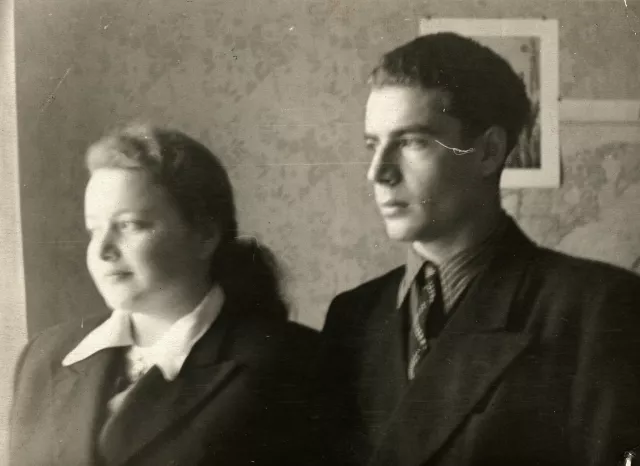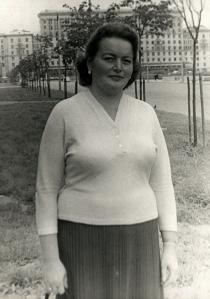Rita Kazhdan and her brother Georgy Fridman
Here I am with my brother Georgy Fridman in 1952 in Leningrad. Georgy and I were so attached to each other that he visited me in Leningrad on vacations. This picture was taken on such an occasion.
The Soviet army liberated Belarus in June 1944. So for us the war was over on exactly this day. The house in Minsk, in which our family had lived before the war, had burned down. For days on end my brother and I strolled about the ruined city. Fortunately, my uncle Leonid Rubo, the husband of dad's sister Fanya, arrived from Moscow within a week. He was deputy people's commissar [deputy minister] of the electrical industry of the USSR and was able to fly to Minsk to get us. He took us with him to Moscow. And we flew in a warplane. In Moscow we began a difficult, but normal life.
As there was a system of ration cards for foodstuffs in 1944 and 1945, my brother and I couldn't stay in the same family because it was very difficult for the family to keep two orphaned children. My aunt Fanya had two kids of her own. Then my brother Georgy I and joined the family. Uncle Leonid was the only person in the family who worked. How could he keep such a horde? The ration cards were given according to the registered number of people in the family only. So, according to the registration there were two grown-ups and two children in the family, and the ration cards were only for them. But they had to feed us, another two mouths, too, although they didn't have ration cards for us. To get the cards they would have had to register us in Moscow, and for that they would have had to adopt us. It was too complicated, so they brought us up and shared food with us. They decided to dispatch me to Leningrad in agreement with dad's sister Tsilya, and Georgy remained in Moscow.
By March 1945, I had already moved to Leningrad and went to school. My aunt persuaded the school to accept me into seventh grade, as I was grown-up enough. Having lived for many years in a Belarus environment, I made an incredible number of mistakes in Russian at first. But after a month of study I wrote quite correctly. I was on friendly terms with everybody in the school. I didn't experience any anti-Semitism. All children had gone through the blockade. I liked sketching and chemistry very much. I didn't get on very well. I tried, but it was very hard for me. Because, in spite of the fact that I had been an excellent pupil before the war, I had forgotten everything under the terrible war conditions. There were neither newspapers nor books.
I completed school more or less well. Then I entered the Food Industry Technical School. It was the only place where they accepted my documents. I don't know why I applied to this place. Firstly, there wasn't a person to ask for advice. In 1946 there weren't so many educational institutions. They hadn't been reorganized yet. Secondly, the technical school was situated in a beautiful place on Palace Square. I studied for three years and after one of the incidents at practical work I decided such a study was not for me.
We did practical work at the distillery. Our task was to determine the type and the age, and other characteristics of wines by smell and by taste. But the wines were very delicious. The women who worked there, always carried a noggin and herring or vobla [salted stockfish] in their pockets. For the most part, they drank spirits. But we drank wine as it was our duty. And drank as much as we liked - we were young. And at the distillery, there was the following order: if you managed to walk out through the checkpoint on your own feet, then OK, good luck, go home. But if you fell down at the checkpoint, well, then they left you to spend the night at the factory. Once we were all drunk but managed to leave on foot. Three of us - all girls - went home to together. In the morning, I woke up on a chest and said to myself: 'This isn't for me!' And shortly after, I left work and found another job.










